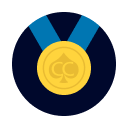antonis32123
Legend
Loyaler
Planning your next moves , based on the opponent's range of cardsis essential , in order to improve ypour resultrs and decisions . The more info you have on him , the better and more right ranges I guess you can predict for his hands on most occassions 
About the video quiz , I would put him directly to KK+ , or less to AKs or AK , nothing else . Ofcourse the stack after him that shoved , the bigger stack ,covered all players , he could have a wider range of shoves , so elli was his name ?? He could call I guess with more hands like QQ , or even JJ , but wider than that I don't think .personally directly I would put him to KK or AA , less to AKo or AKs , anything else would be too risky These big stacks , damn , they shove ATC and win , lol
These big stacks , damn , they shove ATC and win , lol 
About the video quiz , I would put him directly to KK+ , or less to AKs or AK , nothing else . Ofcourse the stack after him that shoved , the bigger stack ,covered all players , he could have a wider range of shoves , so elli was his name ?? He could call I guess with more hands like QQ , or even JJ , but wider than that I don't think .personally directly I would put him to KK or AA , less to AKo or AKs , anything else would be too risky





















